Here, I provide a detailed list of handyman tools that you’ll need to start a profitable handyman business.
In fact, these are the same exact tools I have acquired over the years as a pro handyman while doing a wide variety of projects, from small home repairs to hanging TVs.
You can use this as a checklist for purchasing tools or as a guide to purchasing the best tools for a handyman you know.
Let’s jump right in.
Contents:
The Art of Buying Tools
Here are some quick things to consider before you spend several grand on the tools I’ve listed below.
#1 – Every handyperson is different
As I’ve said many times before, not all handymen can or will offer the same services. Some will lean toward landscaping work, while others may focus largely on plumbing or electrical. Then, others will do everything from small sprinkler repairs to kitchen remodels. There are unlimited combinations of services you can offer.
In many cases, the local laws and codes will determine what projects you can do.
This will have an obvious impact on which tools you need. That being said, most handymen will end up handling a wide variety of projects, including:
- Most carpentry (door, window, siding, and fence repairs)
- Small landscaping projects and repairs (sprinklers, fences, and cleanup)
- Minor electrical (replacing light fixtures, ceiling fans, changing outlets, etc.)
- Minor plumbing (replacing faucets, toilet drain valves, etc.)
- Small painting projects
- Drywall repairs
- Tile repairs
- Hanging pictures and shelves
- And more
#2 – You don’t need every tool I’ve listed (yet)
The best way to invest in tools is to buy them as needed. Instead of spending thousands to stock your work truck fully, invest in the essentials to start and upgrade as necessary. This especially applies to power tools and specialty tools.
Sure, this may mean a few extra trips to the store during projects, but that comes with the territory when getting started.
Consider renting certain tools. When you rent a particular tool often, it’s time to buy your own. Power washers, cutoff saws, and tile saws are good examples.
#3 – Buy high-quality tools…sometimes
Some people say you should always buy the best quality tools because they will last longer and be more effective. I agree in many cases, such as when purchasing a power drill or other tools you will use on nearly every job or when purchasing precision tools like levels.
But in some cases, especially for tools you rarely use, the cheap stuff works just fine. For example, I once purchased a tap set. Since I knew I would rarely use it, I got the cheapest one I could find from Harbor Freight, and it was a great choice. I may never use it again.
In fact, many of my tools to this day are homeowner-quality tools because that’s all I need. This saves money, and it’s less painful when I lose a tool.
So, don’t go overboard when buying tools to start your business. Just start with the essentials and upgrade as you go. Your customers will not know the difference, but your profits will.
Handyman Tools List
Essential Power Tools
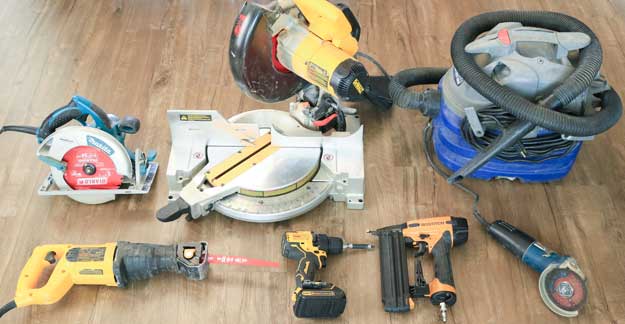
These are the power tools that I consider essential for most handymen because they are used frequently for a wide variety of projects.
- Circular Saw
- Miter Saw (Single bevel minimum)
- Handheld Shop Vacuum
- Reciprocating Saw
- Power Drill
- Brad Nailer
- Angle Grinder
Other Common Power Tools
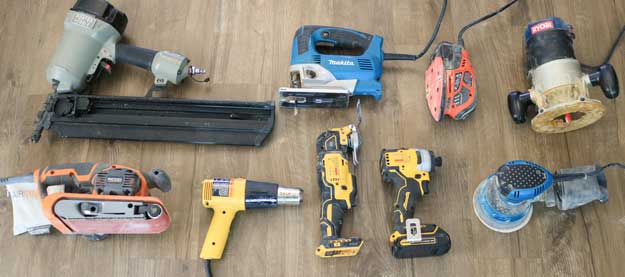
Here are more commonly used power tools that you will eventually acquire. Note that some tools on the list are not in the picture above.
- Framing Nail Gun
- Jigsaw
- Mouse Sander
- Router
- Belt sander
- Heat Gun
- Cordless Oscillating Tool
- Impact drill
- Orbital Sander
- Air Compressor (if using pneumatic tools)
- Dremel set with various tips
- Power Washer
- Paint sprayer
Essential Hand Tools (Carried in the tool bucket)
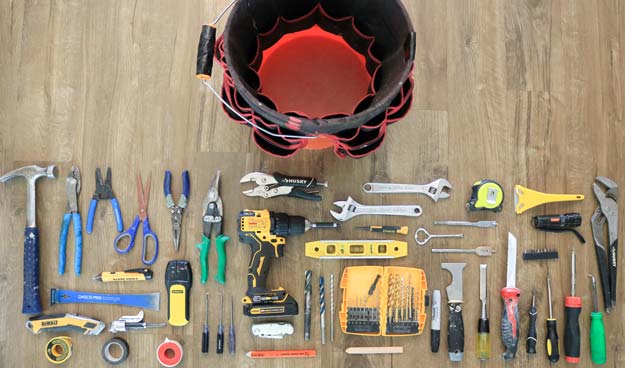
A well-organized tool bucket is incredibly useful and makes efficient work of most tasks. The key is to stock tools that allow you to accomplish most things without having something so heavy and disorganized that you can’t carry it. Here is my interpretation of the best way to do that.
- Hammer
- Cordless Power Drill
- Adjustable wrench x 2
- 12” Tongue and Groove Plier
- Wire Strippers
- Crimping Tool With Cutter
- Longnose pliers
- Locking Pliers (Standard and Needle Nose)
- Scissors
- Tin Snips
- 5-in-1 painters tool
- Trim Pry Bar
- Wood Chisel (5/8” or 3/4″)
- Window Scraper
- Torpedo Level
- Screwdriver set or high-quality ratcheting screwdriver with various bits
- Angle driver
- Mini LED Flashlight
- Measuring Tape (16′)
- Drill Bit Set
- Masonry Drill Bits (3/16”, 1/4”, 1/2”)
- Stud Finder
- Folding Box Knife
- Magnetic Screw Tip Holder
- Screwdriver bit set
- Nail Set
- Hook and Pick Set
- Large Pick Tool
- Handheld drywall saw
- Paint can opener
- Pencil
- Sharpie
Other Essential Hand Tools (not in tool bucket)
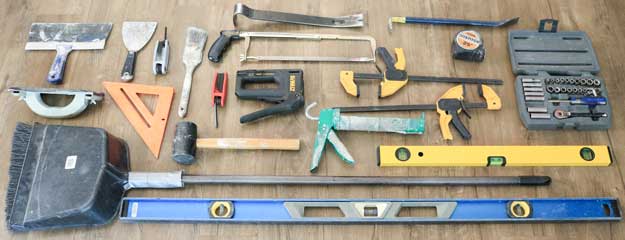
Unfortunately, not everything fits in the one tool bucket. Here are more must-have hand tools for home repairs and improvements that I always pack in my work truck.
- Socket Set
- Socket to drill adapter
- 2’ Level
- 4’ Level
- Measuring Tape – 25′
- Pry bar large
- Nail Puller
- Precision Screw Driver
- Allen Wrenches (Standard and Metric)
- Caulking gun
- Broom and dustpan
- Clamps
- Putty knife
- Drywall Taping Knife
- Rubber mallet
- Paintbrush
- Speed Square
- Staple gun
- Hand sander
- Hacksaw
Other Hand Tools
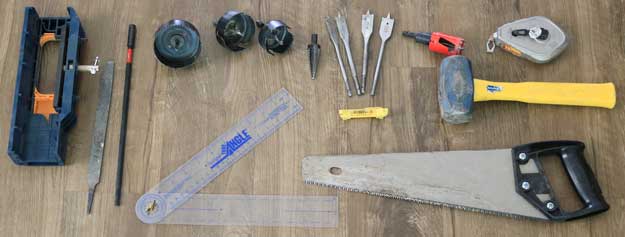
Here are more hand tools. These are less commonly used but still noteworthy and worth having on hand. Again, not all the tools listed below are shown in the image.
- File
- 3-lb sledgehammer
- Hole saw (2.5”)
- Hole saw (various sizes)
- Door hinge and knob router jig
- Snapline
- Stepped drill bit (a.k.a uni-bit)
- Screw bit extension
- Hand saw
- Combo square
- Compass
- Angle finder
- Mason Chisel
- Line level
Essential Handyman Accessories
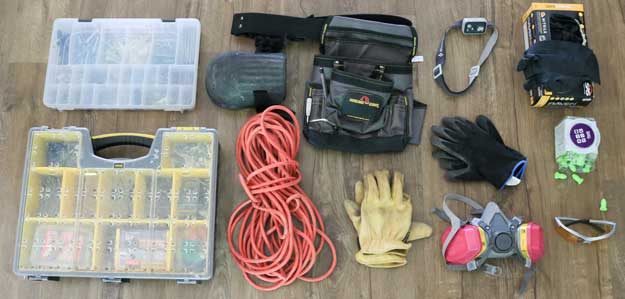
Of course, you’ll also need tools to carry your tools and tools to help make using your other tools easier and safer. Here is a list of those.
Organization
- Toolbelt
- 5 Gal Bucket
- 5 Gal Bucket Tool Organizer
- Screw & nail organizers
Accessibility
- Headlamp
- Saw Horses
- Ladder
- Step-stool
- Extension Cords (25′ and 100′)
Safety/Health
- Safety Glasses
- Earplugs
- Respirator
- Knee Pads
- Nitrile gloves
- Mechanic gloves
Accessories – Nice to Have
- Extension cord reel
- Extension Ladder (If doing roof work)
Common Supplies, Screws, and Fasteners
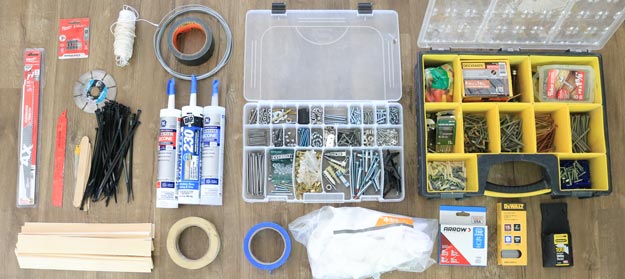
Unfortunately, you can’t carry an entire hardware store in your work vehicle, so you’ll need to be selective on which screws, nuts, bolts, and supplies you stock in your truck. Here is a short list of the supplies I’ve found most important to have on hand.
Blades/Cutting
- Reciprocating Saw Blades (Metal and wood)
- Angle Grinder Metal Cutting blade
- Angle Grinder Diamond blade
- Extra Utility Blades
Fasteners
- Exterior wood screws (1.25″, 2.5″, & 4″)
- Drywall anchors (3/16” Toggle bolts (4”) & Plastic plug type)
- Brad nails (various lengths)
- Staples for staple gun
- Zip Ties
- D-ring picture hangers
- 4D 1.5″ nails (for hanging pictures)
- Random screws, nuts, bolts, washers, and other fasteners leftover from past jobs
Adhesives & Caulking
- White exterior caulking
- White silicone caulking
- Clear silicone caulking
- Electrical Tape
- Teflon Tape
- PTFE Thread Seal tape
- Duct Tape
- Masking Tape
- Wall patch/wood filler
Other supplies
- Extra #2 Phillips head screw tips
- Shims
- Painting rags
- Wire connectors (variety pack)
- Popsicle sticks
- String
- Picture handing wire
Handyman Tools for Basic Specialty Work
Basic Electrical Tools

Not all handymen will do electrical work, but it still often pays to have the basics on hand. The list below will get you through most basic electrical projects.
- Voltage tester pen
- Multimeter
- Needle nose pliers
- Crimping tool with cutters
- Wire strippers
- Low voltage staple gun & staples
- Electrical tape
- Long auger bit (at least 50″ length)
- Glow rods
Basic Plumbing Tools
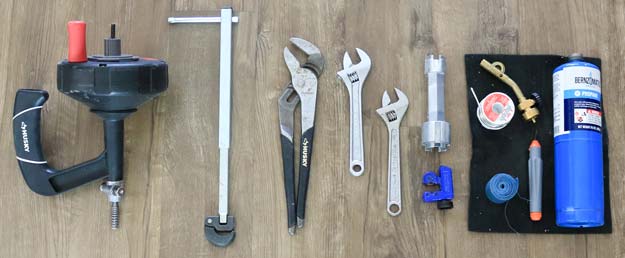
As with electrical, not all handymen will do plumbing services, but you’ll inevitably get involved at some point. Here are the basic tools that can help you with most minor plumbing projects.
- Drain auger (snake)
- Basin wrench
- Groove joint pliers
- Adjustable wrenches
- Drain removal tool
- Pipe cutter
- Torch & fuel
- Debur tool
- Plumbers cloth abrasive grit roll
- Solder
- Heatshield
Basic Landscaping Tools
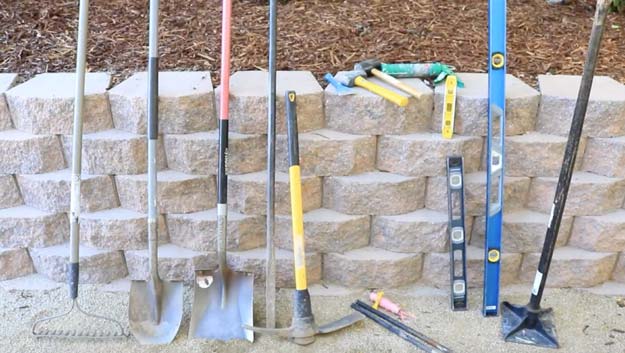
Personally, the only landscaping I’ve done as a pro is fence repairs. However, I’ve still found these tools essential for other outdoor projects.
- Metal rake
- Spade shovel
- Flat nose shovel
- Digging bar
- Pickaxe
- Tamper
- Wheelbarrow
Basic Painting Tools
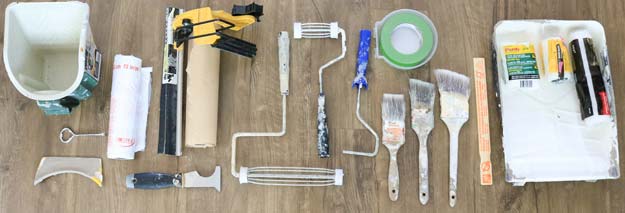
Even though I avoid painting because it’s not very profitable, I still have basic painting tools if painting becomes part of another project.
- Handheld paint bucket
- Hand masking tool with paper and plastic rolls
- 5-in-1 Tool
- Paintbrushes (various sizes)
- Paint rollers (various sizes)
- Masking tape
Basic Tile Tools
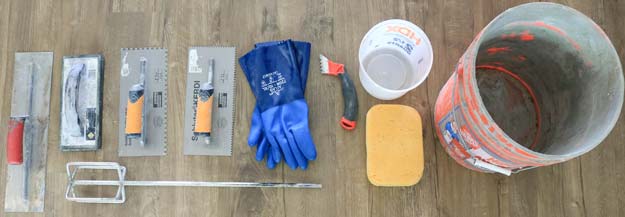
Tile repairs are easy and profitable, although uncommon for me. This list of tools will help you manage most tile repair projects.
- Float
- Trowel (various sizes)
- Buckets
- Paint and mud mixer
- Sponge
- Grout removal tool
- Gloves
Final thoughts
As you can see, the list of tools you will acquire as a pro handyman is long. In fact, you will likely have even more tools than this after a few years in business.
The key is to start with the essentials, acquire tools as you go, and find a system and setup that works best for you.
In short, the best handyman tools are the ones you need right now.
What do you think? Did I miss any essential tools? Let me know in the comments below.






Hi Dan,
I’m guessing that you were looking in my trailer when I wasn’t looking! I have virtually every tool that you listed here, and a couple more (table saw, compound tile saw, scaffolding, airless paint sprayer, propane heaters, etc.). Great list, and I think your advice is spot on….. buy it if and when you need it. Personally I would rather buy a tool than rent it, primarily because the time needed to run around and find one for rent is often excessive. I sometimes rent a gypsum board lifter because of the cost and the room required to store it, but that’s about it.
Anyhow, great work Dan. Now I’d like to ask you a question….. I’ve been trying to find someone to hire as I have way too much work (even at $90 an hour) for one person. Do you have any advice on the following:
1) Essential skills they should have to start
2) Ideal starting wage
3) Maximum wage for a good/great hire
4) Would you add a benefits package to the mix
5) What’s the best way to find someone (advertising, word of mouth, etc.)
At the moment I’m getting almost no applicants, and it’s frustrating. I’d love to hear your thoughts on this.
All the best,
Bruce Williams
Northern Lights Renovations and Handyman services
Thanks for the comment, Bruce. I don’t know the answers to your questions because I’ve never hired anyone. I prefer to operate solo. However, when it comes to attracting workers, the same rules apply that apply to marketing. Understand who your ideal employee is, their pain points, fears, and frustrations. Then, craft your message to engage them on an emotional level. Sorry I can’t help more. I’ll consider partnering with someone who has hired employees to create some useful content on the topic.
Hey guys…I have some insight on hiring a helper. I will be looking for the following:
A good attitude
A willingness to learn
Punctual
I can teach everything else. I would also be looking for someone who hasn’t been coddle their whole lives, maybe parents have had physical labor jobs. Most importantly they have had some type of job before and are willing to learn new skills. If they have been working in construction in the past I would start at whatever you can mutually agree on, maybe $15/hr then see what they’re capable of through a 2/4 week evaluation. If they’re skilled and have proven to be effective then bump it to $20. This is based on Oklahoma cost of living.
I managed hotels and have an associates in management with an emphasis on HR.
Thanks for everything Dan!
Sincerely,
John Wilson
Alliance Handyman Services
Tulsa,OK
Great list!
Especially if you do plumbing, I find it essential to carry 2 pipe wrenches (always use one as a backup) as threading/unthreading pipes or even drains can be a real pain with regular slip joint pliers.
Great article, Have you thought of providing a resource on how you organize your work truck? It’s a challenge, especially for those of us with small cargo vans and limited space!
Your tools list is the most comprehensive list I have seen to date! Extremely useful in deciding and knowing what tools are needed, saving money and time. I am going to use your lists to compare to what I have and what I need and update my tools lists. Thank you!!
You are welcome. So glad you have found it helpful, Desmond.
That’s a good list. My Ridgid toilet auger get used a lot, don’t like to pull poo filled toilets unless I have to. Dryer vent cleaning brushes are cheap and easy to make money with. Drop cloths and moving blankets are handy too, always leave the home cleaner than you found it. Dewalt has a folding work table that is handy also. A telescoping extension ladder by Extend a climb and a folding Little giant ladder get me to almost every roof and ceiling I need.
I work out of a Nissan NV for my regular job, but for my side handyman, plumbing and a/c business I actually like my 7×14′ enclosed trailer better. You can stand up easily inside, haul water heaters standing up, and whole split system ac units also. Ramp door on the back makes loading easy. It’s a little longer and harder to get into some spots, but I rarely have to run for parts with how I have stocked it.
I built my business slowly with no debt over the last 5 years, just reinvest your profits as you go in tools, equipment, and parts you know you’ll rotate out quickly. Keep your eyes open for other opportunities while in houses, and don’t be afraid to make suggestions to people how they can make their homes better and how you can save them money. All of my business is through referrals, and I usually clear 3-5k a month without trying very hard. A simple business card and T shirts with your business go a long way for cheap. Always leave a couple cards with clients, and if you do clean work and show up reliably, you’ll grow.
That sounds like excellent advice, Murf! Thanks for sharing a few tools and project tips. Hopefully, people realize the value of those tips and put them to work!
Looks like a pretty good write up, Dan the Man, handyman extraordinaire! I live out in the sticks of Colorado- very rural area (3 miles to my mailbox, 1-way). I would also include drywall tools/equipment- from the T-square and knife to cut wallboard, assortment of knives (minimum 6″ & 8″, I’ve got from 2″-12″ with a bucket scraper) for taping and floating mud (don’t forget the banjo if you do a LOT of tape coat) and the hopper with different size tips for texture (mines a harbor freight special, works great).
Out here, fencing can be good money. Not the privacy style, I’m talking about smooth and/or barbed wire, no-climb mesh, split rail, sometimes white vinyl, but not much of that. Means shovels, digging bars (breaking rocks, it is the Rocky Mtns), fencing stretchers, wheel barrow and hoe for mixing concrete (it can also be dry-packed, no water needed).
Fire mitigation…that means chainsaws and a very good understanding of how they are used, weed whackers (I’ve figured out a way to attach a Marathon 24 tooth framing blade to mine! It’s fantastic!!), lawnmower (riding). If the customer doesn’t want the downed trees, you can sell the wood as firewood (wood chipper, log splitter, etc.,). But now, we are talking some serious money. Could possibly specialize in mitigation/landscaping.
Here’s one I never saw coming- automotive mechanic. Once the locals learned I could turn a wrench- and apparently I’m fairly good at it (they say), I’ve probably spent more time laying in the dirt doing u-joints, dropping fuel tanks, brakes, fluid changes, etc… than I have being in someones house doing house repair! If you’ve ever been in a shop, and seen those tool boxes- full, well that’s a down payment on a house.
I’ve even been paid- no joke- to shoot the prairie dogs on a horse ranch! To include any badgers. If it digs, it dies. Skunk are my favorite…NOT! And the tools I use for that are a Ruger 10/22 (modified) and a 12 gauge with various size shot shells.
As “handymen”, we all wear different hats on different days. We will do anything and everything to do a job (as long as we are doing it legally). With that said, I’m going to safely say that, the list of tools we use, is quite inexhaustible. It would take volumes of books to list the tools, and the skill sets, that can/could be involved in what we do.
Ok, I’m done now… really. (Never hung a tv on a wall before…)
Wow, Ben, that is a fun list of jobs. And I totally agree, as a handyman you will encounter some weird jobs, especially if you are open to using your problem-solving skills to help your customers. When that’s the case, buying tools and learning skills never ends. That’s one thing I love about being a handyman.
It is amazing how the tool pile can grow. When I started I figured I had everything I needed (a few tools in my closet). But once you do something the long way enough times, it makes sense to buy more! Argh!
For me the essential tools are in a canvas battery drill bag. Tape measure, drill, impact driver, and a small assortment of pliers, stud finder, mini level, mini-hammer… Then the big general stuff gets lugged around in a big yellow plastic toolbox and rarely used. And the other common tools: jigsaw, 2 foot level, box of screws and caulking get stuffed somewhere in the truck. Everything else stays at home or in the workshop until I know it’s needed!
Yes, the tools add up quickly! Thanks for sharing your essentials, Andrew.
Hey Dan, are you sure you didn’t look in my truck.
Haha, I’m glad you’ve landed on a similar setup. I’ll just assume that means we both have good taste!
Good advice about when and how to buy tools. Your list of tools is very comprehensive and informative especially for someone thinking about starting up a handyman business. The list may seem extensive to some but I believe I have acquired, or previously owned, just about everything on your list over the last 4 plus years I’ve been operating Do Right Handyman in Murfreesboro Tn. Your information and advice were key when I started thinking about starting my business. One thing I can’t do without is an 18″ x 24″ kneeling pad (not knee pads) and a lightweight 3 step aluminum ladder. Keep up the good work….you are helping a lot of people understand what they need to think about before jumping off in the deep end. Jay
Thanks for the kind words, Jay, and the tip on the kneeling pad and ladder.
-Dan
I think I have more than 90 percent of the tools listed. I saw a few that I’m not familiar with but will purchase because I could definitely use them, e.g., Angle driver.
Thanks for the list and “have a Good Handyman day”
You’re welcome, Percy!
Thanks for the list Dan! I’m still part-time handyman as I own a few rental properties, (still making payments) and subcontracting with a friend with his electrical business. Too nervous to depend on full time handyman income while making house payments. And I may only ever be part-time as I now I’m flexible enough do my own repairs at my rentals. Great way to practice a few new things before actually doing it on a customers home. Electrical is my specialty. Over the last 8 years I’ve slowly been buying electrical tools as friends as asked for electrical services while fully employed. Eventually I decided why not do something like this but be self-employed and learn some new skills. Now over the last 2 years, been slowly building some funds from completed painting, electrical, flooring, very minor plumbing jobs and buying other tools as needed. One tool I have found useful is a tungsten carbide blade for my oscillating tool. Sometimes you need to cut very hard metal. Find it online at Multi-fit Blades. Love the tip about renting tools as I have done that several times if I don’t know if it’s a tool I’ll use often. Also enjoyed reading other comments!
Great, thanks for the tip on the tungsten carbide blade! I’ll have to give that a try. Maybe it can replace my angle grinder for certain cuts.
Great website, I often back here, and you never let me down. Your articles are brilliant.
Thanks for stopping by and leaving a comment!
I’ve found a 24 inch framing square to be very useful.
what do you think the basic total amount of money it would cost for all the maintenance tools need for a maintenance business?
I think that you could buy enough tools to get started for less than $2,000 and then buy new tools as you go. It’s tough to give an exact amount because it depends on what services you plan to offer.
It’s really nice to hear that some individuals contend that investing in high-quality instruments is always a good idea since they will perform better and last longer. You said that this is true in many circumstances, including when purchasing a power drill or other gear you will use on practically every task or when acquiring precise instruments like levels. I will take note of this suggestion because I need a trip to the hardware store to buy my brother some handyman tools he can use to tinker around the house. Thanks.
Excellent list. I am currently putting together a low mileage 2006 E350 KUV as I start the next phase of my career, into semi retirement. A skilled handyman. Most of the tools in the article I have accumulated over the past 6 decades, but I did relate to a good short list of items I always take for granted but should put on my truck a d not stow in the garage.
The ultimate decision is to use what I have accumulated over the years (some great older school tools) or go massive shopping???? TBD. I plan to post my fully tricked out KUV in Oct 2023, when its fully loaded with my tool arsenal. Thanks to every one who reads this and thanks for the reconfirmation. Chris, Richmond, VA
I think this is a great list. There are a couple bucket items I use as well, that aren’t listed. You have a mini flashlight, but honestly as good as that is, I use a magnetic/positional light far more often plus a headlamp. I also, for some reason, find I am always needing a 3M pad. A non-bucket essential for me is a 50′ hose and a high power spray nozzle. A magic eraser is great to keep handy for misc. cleanups and I always have an old bath towel.
All good things to carry!
Great article, thumbs up. Nicely said about the quality of the tools, I can agree totally. I had an incident couple of months ago as I bought “not that much” used line trimmer. It went in flames after I used it couple of times. Since then, I’ve only been looking for brand new tools when in need of them. It’s costs a bit more, but at least I feel safer that way rather than trusting a random person.
Great article and the comments are just as worthwhile. Any ideas on tool organization? Van organization? Maybe you have written about these already and I am just clueless or lazy.
I don’t have any content on that topic. Thanks for the idea, though.
Great tool list! I’m just starting a part-time handyman business, but I already have <90% of your list. The one subject that I was surprised wasn’t listed is Chemicals: WD40, Electric contact cleaner, brake cleaner, 3-in-1 oil, white lithium grease, graphite lube, mineral spirits, lacquer thinner, Everclear (food grade cleaner), TSP, lighter fluid, penetrating oil, Dawn dishwashing detergent, EvapoRust, aircraft paint remover, PVC/CPVC primer/cleaner and glue. etc.
Those sound like good additions, they just aren’t tools.
This blog post is an absolute treasure trove for anyone starting a handyman business or just looking to build a well-rounded toolkit! The level of detail and organization makes it incredibly user-friendly, from essential power tools to specialty supplies. I particularly appreciate the practical advice on buying tools as needed and knowing when to invest in quality versus opting for budget-friendly options. The pro tips, like renting tools initially and keeping a mix of fasteners and supplies, are game-changers. This comprehensive guide truly sets a strong foundation for success-thank you for sharing your expertise so generously